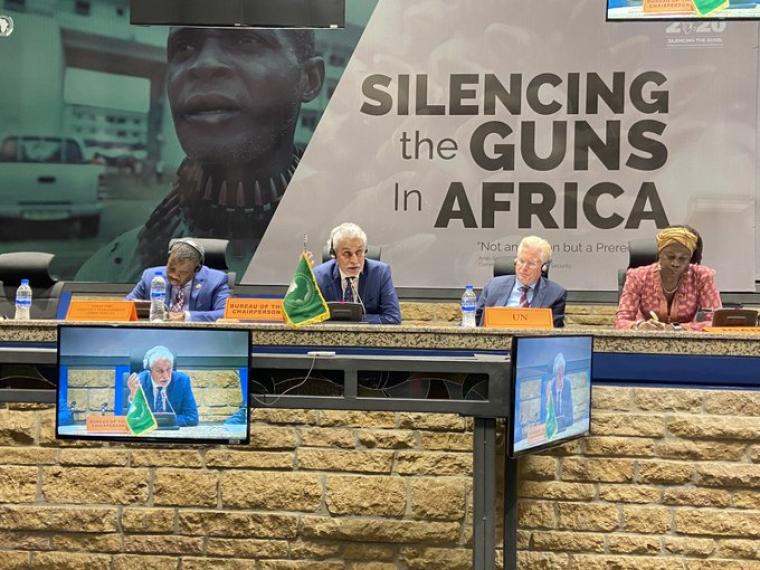African Union preparing for inter-Sudanese dialogue

Third Meeting of the AU Expanded Mechanism on the Sudan Crisis, May 31 (Photo: AU)
The African Union will organise a meeting in September to prepare for a Sudanese-Sudanese dialogue conference. More than 60 politicians, rebel leaders, civil society activists, and academics will participate. Wajdi Saleh, leading member of the Arab Socialist Baath Party, urges the formation of an inclusive civilian front against the war.
The African Union yesterday announced that it will organise a preparatory meeting for a Sudanese-Sudanese dialogue in September.
Among those invited are former Prime Minister Abdallah Hamdok, representatives of various political blocs, professional groups, rebel movements, academics, and civil society leaders.
The list includes the two opposing factions of the Forces for Freedom and Change the mainstream FFC-Central Council and the FFC- Democratic Block, the Arab Socialist Ba’ath Party and the Communist Party of Sudan, which withdrew from the FFC-CC, rebel leaders who signed the Juba Peace Agreement with the Sudanese government in October 2020, the Sudan People’s Liberation Movement-North faction led by Abdelaziz El Hilu and the mainstream Sudan Liberation Movement under the leadership of Abdelwahid El Nur.
The preliminary meeting aims to discuss the extent of representation in the Sudanese-Sudanese dialogue and the parties to be invited, the agenda, the structure of the dialogue, the place and date, its funding, and the role of the international community.
Radio Dabanga contacted a number of those whose names are included in the invitation list, but they denied receiving any invitation already.
Sudanese archaeologist, thinker, writer, and political activist Mohamed Jalal Hashim on his Facebook page yesterday denounced the “publishing of the list of invitees, if these are correct, before obtaining the consent of the parties involved”.
The inter-Sudanese meeting was originally scheduled to take place at the African Union headquarters in the Ethiopian capital on August 25.
AU roadmap
On May 27, the African Union Peace and Security Council in Addis Ababa agreed on a comprehensive roadmap to end the violence in Sudan. The roadmap aims to “establish mechanisms to coordinate support to Sudan, secure an immediate, permanent, inclusive and unconditional cessation of hostilities”, and to “give impetus to the agency of neighbouring states, and promote the resumption of an inclusive, fully representative political process”.
Following a meeting of the Expanded Mechanism for the Resolution of the Conflict in Sudan, Mohamed Al Hacen Lebatt, AUC Chairperson’s principal strategic adviser and Special Envoy to Sudan, on May 31 told reporters in Addis Ababa that “an inclusive political process should include constitutional arrangements for the transitional period, the formation of a civilian government, and programmes to address the civilian population’s needs in terms of food and security”.
The FFC-CC coalition of progressive political groups, however, opposed the participation of affiliates of the ousted regime of ousted President Omar Al Bashir and other “anti-democratic forces” in the inter-Sudanese dialogue. Leading FFC-CC member Yassir Arman said in a statement on August 1 that the involvement of members of the dissolved National Congress Party of Al Bashir in the dialogue would never lead to stability in Sudan.
Other initiatives
The AU roadmap is one of the three initiatives to end the war in Sudan. The USA and Saudi Arabia began negotiations with representatives of the warring Sudan Armed Forces (SAF) and the Rapid Support Forces (RSF) soon after violence erupted on April 15. The successive humanitarian ceasefires agreed on were all violated.
The Intergovernmental Authority on Development (IGAD) for the Horn of Africa in June formed a Sudan Quartet (Kenya, South Sudan, Djibouti, and Ethiopia) that is to deal with the violent crisis, but the SAF boycotted the meeting as it opposes the Quartet’s chairmanship of Kenya. “Kenya is not neutral and is home to RSF rebel leaders,” Sudan’s Sovereignty Council stated in mid-June.
Egypt organised a summit for Sudan’s seven neighbouring countries in mid-July. The attendees agreed to establish a ministerial mechanism, which is to develop an action plan to reach a comprehensive resolution for the war in Sudan.
Broad civilian front
Wajdi Saleh, lawyer and leading member of the Arab Socialist Baath Party, has warned that “delays in the formation of an inclusive civilian front against the war will open the door wide for foreign interventions, and put the country in jeopardy”.
He told Radio Dabanga yesterday that progressive political and civilian groups in the country, including resistance committees, formed a united civilian front on April 29.
Saleh pointed to the multiplicity of initiatives and mechanisms to stop the war and called on “everyone to rally around one front” and “have a calm and quick discussion between the various forces on the outstanding political points and required tools and means as soon as possible”.
He warned that the continuation of the war, which he called “treason”, will lead to further division and fragmentation of Sudan.











 and then
and then